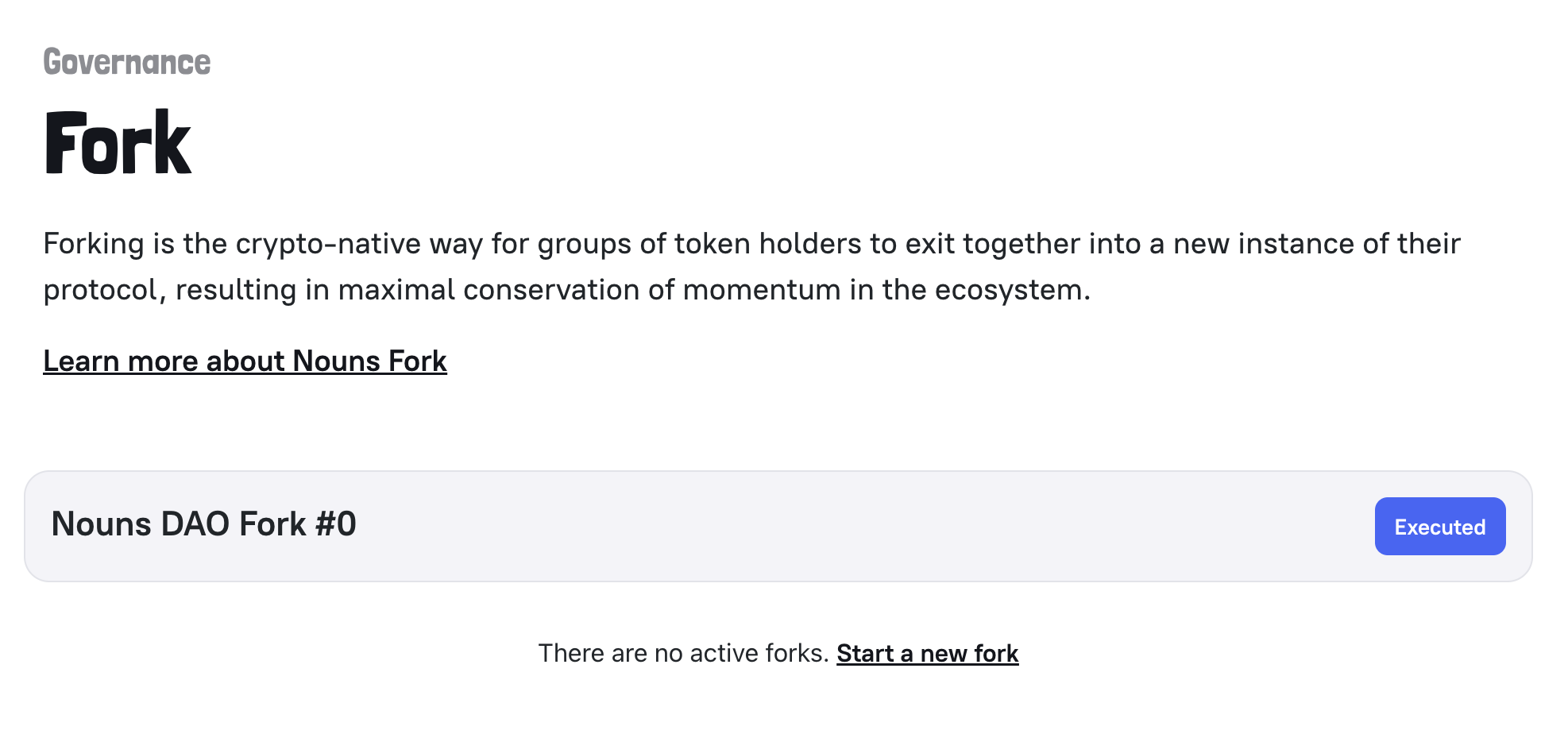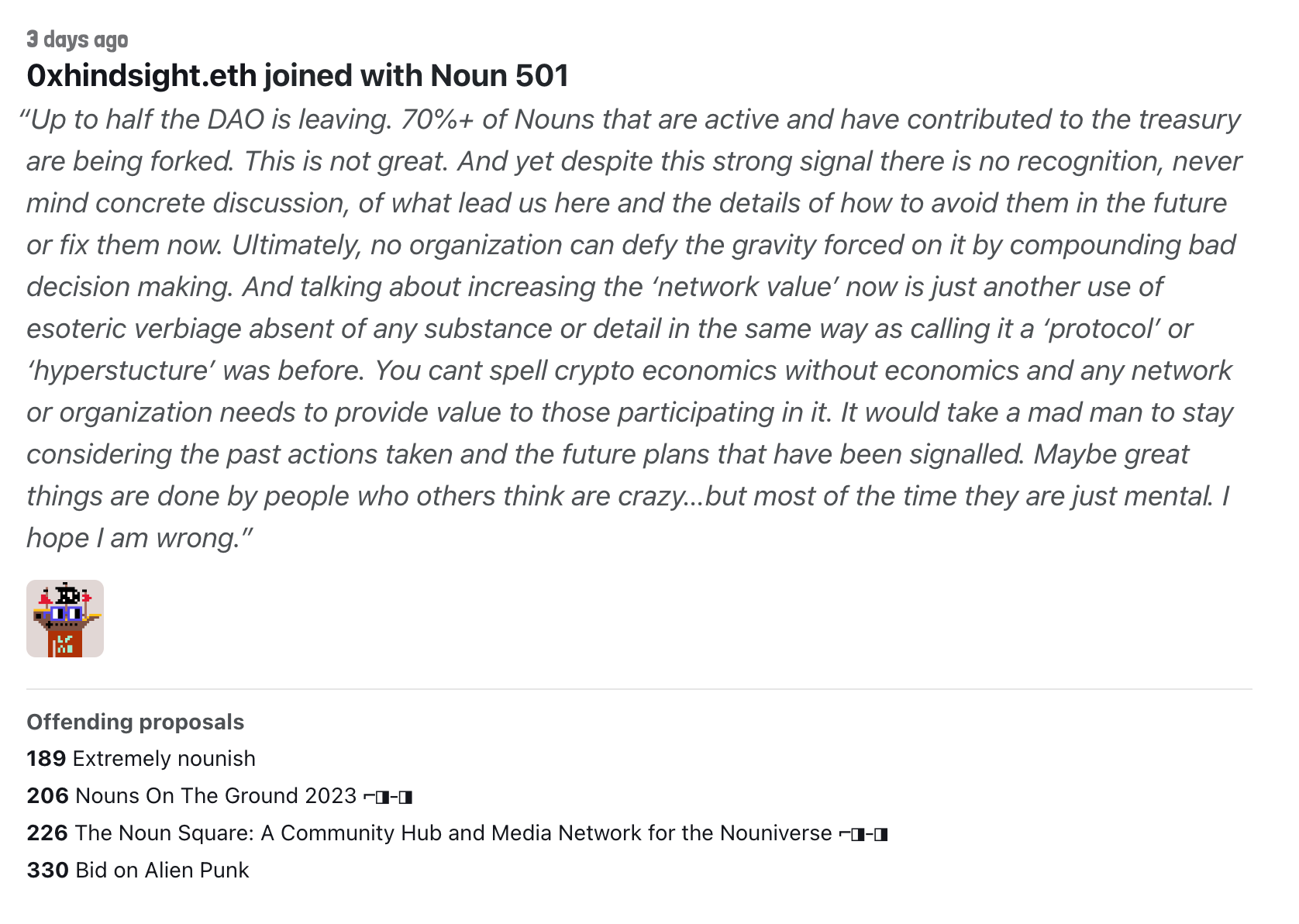On Forks
A democracy cannot exist as a permanent form of government. It can only exist until the majority discovers it can vote itself largess out of the public treasury. After that, the majority always votes for the candidate promising the most benefits with the result that a democracy collapses because of the loose fiscal policy – to be followed by a dictatorship.
- Alexander Fraser Tytler
Public blockchains are speed-running lessons in governance, game theory, and social coordination. Of these, Forks represent one of the most interesting new behaviors.
Nouns
This week, Nouns DAO executed a fork allowing token holders to split the treasury. >50% of holders chose to leave the original DAO, sending >14,000 ETH (~$21M) to a new contract.

Holders who chose to leave the DAO were able to provide rationale or include offending proposals that highlight the difference in values:

After joining the fork, holders of the newly formed DAO could "quit", effectively cashing in their token for a proportional share of the treasury. Here is the quit transaction for Noun 536. The owner, nakiri.eth, sent their Noun to the treasury and received the equivalent of ~36.6 ETH ($60k).

This is a social experiment with very real financial consequences. It's not "good" or "bad" – it's a new primitive that is uniquely enabled by onchain composable property.
What's old is new
Perpetuity is implied, if not expressed, in the fundamental law of all national governments. It is safe to assert that no government proper ever had a provision in its organic law for its own termination.
- Abraham Lincoln, First Inaugural Address
Traditional governance models are inherently resistant to radical change, often cementing power structures and leaving little room for overhaul.
However, forking changes the social contract between an organization and its members, serving as an immediate pressure release valve for ideological or operational conflicts. Unlike traditional systems, where dissatisfied parties have limited options, forking provides a structured mechanism to "exit" and create a new social contract altogether.
With forking, we have a streamlined, democratic method to resolve deep-rooted conflicts within a group. The behaviors that lead to forks are not new, but our tools for dealing with them are.
More competition, more innovation
The most common and durable source of factions has been the various and unequal distribution of property. Those who hold and those who are without property have ever formed distinct interests in society.
- Federalist Papers No. 10
Forks function as a kind of organizational mitosis, allowing for the birth of smaller, highly aligned factions within a larger ecosystem.

The act of forking provides dissenters with the capital—both social and financial—to realign and concentrate on neglected objectives.
The result is a form of natural selection within the community that drives competition and innovation. Small, more focused groups that emerge from a fork can disregard conflicting agendas from the larger group. They are free to focus exclusively on specialized projects or issues that may have been marginalized or completely ignored within the larger framework. This innate competitive pressure is a powerful catalyst for innovation, incentivizing both the parent and child organizations to outperform each other and continuously evolve.
Interestingly, this phenomenon flips the traditional narrative. Startups are the main driver of innovation today, but they are often started from scratch and eventually acquired by large corporations. With forking, we may see a rise in large organizations giving birth to innovative small groups. The treasury assets that they inherit provide immediate capital and reputation, while their alignment on goals provides social capital.

This ability for smaller, aligned groups to self-fund and swiftly execute makes blockchain forks a fascinating, decentralized counterpoint to the venture capital model of financing.